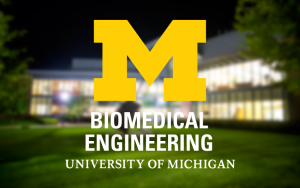Presented By: Biomedical Engineering
A Novel Bioelastomer Platform with Tailorable Design Parameters for Cartilage Regeneration
BME Ph.D. Defense: Yue Qin

Abstract:
Articular cartilage has limited ability to self-repair, which often causes focal defects to progress into post traumatic osteoarthritis. Autologous chondrocyte implantation, a process in which chondrocytes are harvested from the patient, expanded in monolayer culture, and injected into the defect site, is one of the most common approaches to treat cartilage defect. However, chondrocyte dedifferentiation during this process reduces their ability to durably restore cartilage function. Chondrocyte-based cartilage tissue engineering offers alternative approaches for cartilage repair to overcome the limitations of current clinical options by developing environments that combines cues from synthetic scaffold and biological factors to enhance chondrocyte function. However, the translation to the clinic has been limited by our incomplete understanding of how scaffold design parameters interact together to control cell function. Therefore, this dissertation focuses on designing a chondrocyte-based biomaterial platform made with a novel elastomeric synthetic scaffold, poly(glycerol dodecanedioate) (PGD), to investigate the combinatory effects of design parameters on chondrocytes behavior in vitro.
First, this thesis evaluates the effects of surface modification of PGD on the shape and extracellular matrix (ECM) production of chondrocyte, both of which are crucial for robust cartilage formation. I investigated two different strategies to generate a biomaterial surface with high cell affinity: 1) coating with various concentration of collagen type I or hyaluronic acid individually or in combination, or 2) altering the surface charge and roughness using various level of alkaline hydrolysis. Our results revealed the combinatorial effects of ligand composition and density or surface charge and roughness on human articular chondrocyte function.
Lastly, I used finite element analysis to determine if the local strain fields that developed inside the pores under load could be tuned to be within the range shown to have an anabolic effect on chondrocyte function. The tensile strains that develop along 31% – 71% pore surfaces inside of porous PGD scaffolds, according to varying pore size and porosity, were at levels shown to stimulate chondrocyte ECM production, indicating that the pore structural parameters could be tuned to optimize cellular-level strain profiles. These results suggest that porous PGD scaffolds have the potential to guide cartilage regeneration.
Overall, this dissertation produces a platform for cartilage tissue engineering using a novel bioelastomer PGD, in which the scaffold design parameters, such as surface modification and cellular strain, can be modified to enhance chondrocyte function.
Committee Chair(s):
Dr. Rhima Coleman
Zoom Link: https://umich.zoom.us/j/91391389305, Passcode: PGD
Articular cartilage has limited ability to self-repair, which often causes focal defects to progress into post traumatic osteoarthritis. Autologous chondrocyte implantation, a process in which chondrocytes are harvested from the patient, expanded in monolayer culture, and injected into the defect site, is one of the most common approaches to treat cartilage defect. However, chondrocyte dedifferentiation during this process reduces their ability to durably restore cartilage function. Chondrocyte-based cartilage tissue engineering offers alternative approaches for cartilage repair to overcome the limitations of current clinical options by developing environments that combines cues from synthetic scaffold and biological factors to enhance chondrocyte function. However, the translation to the clinic has been limited by our incomplete understanding of how scaffold design parameters interact together to control cell function. Therefore, this dissertation focuses on designing a chondrocyte-based biomaterial platform made with a novel elastomeric synthetic scaffold, poly(glycerol dodecanedioate) (PGD), to investigate the combinatory effects of design parameters on chondrocytes behavior in vitro.
First, this thesis evaluates the effects of surface modification of PGD on the shape and extracellular matrix (ECM) production of chondrocyte, both of which are crucial for robust cartilage formation. I investigated two different strategies to generate a biomaterial surface with high cell affinity: 1) coating with various concentration of collagen type I or hyaluronic acid individually or in combination, or 2) altering the surface charge and roughness using various level of alkaline hydrolysis. Our results revealed the combinatorial effects of ligand composition and density or surface charge and roughness on human articular chondrocyte function.
Lastly, I used finite element analysis to determine if the local strain fields that developed inside the pores under load could be tuned to be within the range shown to have an anabolic effect on chondrocyte function. The tensile strains that develop along 31% – 71% pore surfaces inside of porous PGD scaffolds, according to varying pore size and porosity, were at levels shown to stimulate chondrocyte ECM production, indicating that the pore structural parameters could be tuned to optimize cellular-level strain profiles. These results suggest that porous PGD scaffolds have the potential to guide cartilage regeneration.
Overall, this dissertation produces a platform for cartilage tissue engineering using a novel bioelastomer PGD, in which the scaffold design parameters, such as surface modification and cellular strain, can be modified to enhance chondrocyte function.
Committee Chair(s):
Dr. Rhima Coleman
Zoom Link: https://umich.zoom.us/j/91391389305, Passcode: PGD